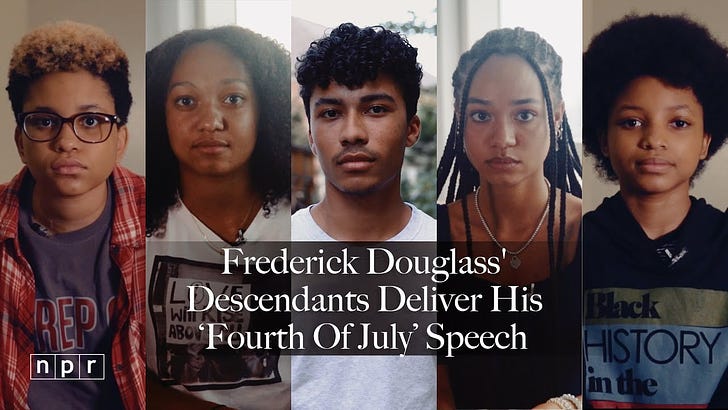Happy Monday! I hope you’re enjoying the long weekend and have a chance to dive into some of these articles today, there are plenty of great ones.
A few that I got a chance to dive into were:
This Atlantic piece dives into the recent NCAA change that allows students to profit from their name, image, and likeness for the first time. I offer my own thoughts on the issue in today’s Hot Take section.
Judy Belk, who serves on the Board of the foundation I currently work at, penned an op-ed in the LA Times about her family connection to the Episcopal church in VA that are paying descendants of those who worked for free or little pay on the church’s grounds.
This New York Times op-ed on the connection between Juneteenth and the Fourth of July.
There are so many great pieces today and I particularly enjoyed putting this volume together as I sat and listened to Frederick Douglass’ descendants read his ‘What to the Slave is the Fourth of July?’
We are looking for folks to interview for upcoming volumes. If you know if anyone who has a unique perspective on the issue of reparations, please email tsmith@reparationslab.org
With radical love,
Trevor
National News
The Atlantic: Give Reggie Bush His Heisman Back
Los Angeles Times: Reparations: Yes or no? My family’s dilemma
New York Times: Between Juneteenth and the Fourth of July
New York Times:Her Family Owned Slaves. How Can She Make Amends?
Washington Post: Frederick Douglass had nothing but scorn for July Fourth. The Black abolitionist spoke for the enslaved.
TIME: You Can't Tell the Story of 1776 Without Talking About Race and Slavery
The Hill: After Michelle Obama said White House 'built by slaves,' historians celebrate their stories
MSNBC: Sha'Carri Richardson's drug test suspension is the end result of racist policies
Philadelphia Inquirer: America’s founders fought for the right to debate critical race theory
PBS: New POV doc explores the history Confederate statues — and why they divide us
NBC: To honor July 4, the NBA should skip the national anthem. Its players already are.
Barron’s: This Advisor Wants to Close the Black Wealth Gap. Accepting Risk Is Key
Essence: The Highland Project Launches Fund for Black Women Seeking to Narrow the Wealth Gap
The Hill: Thousands of pages documenting slavery found in attic of Eastern Shore house
New York Times: Beyond Tulsa, Overlooked Race Massacres Draw New Focus
Regional News
Pioneer Press: St. Paul becomes latest city to study reparations for Black Americans
Brookings Institute: To restore North Nashville’s Black middle class, local policymakers should pursue reparations
Atlanta Black Star: ‘It’s Reparations Season’: Tulsa Pastor Michael Todd Presents $200,000 to Three Living Survivors of Race Massacre
Belleville News-Democrat: What does the term reparations mean? Here are some examples and definitions
Washington Post: Let’s celebrate Florida’s critical race theory student survey
Hot Takes
The Atlantic: Give Reggie Bush His Heisman Back
For decades, universities and the NCAA have profited handsomely off of the labor of college athletes, particularly in the most popular American sports like football and basketball.
Many of today’s biggest stars had a huge impact on their game and university during college (Zion Williamson, Saquon Barkley, Ja Morant), but couldn’t make a dime off of jersey sales or sign any endorsement deals. Over the years, athletes who have taken side-deals have been suspended, had their reputations or tarnished, or in Reggie Bush’s case, had his records and Heisman trophy revoked.
The NCAA has an opportunity to repair past harm it has caused through the four main components of racial repair:
Redress: Acts of restitution, compensation, and rehabilitation.
Accountability: Ownership and willingness to take responsibility for harmful actions
Reckoning: Understanding the what, how, and why of the actions
Acknowledgment: Admission that harm has been done and a commitment to non-repetition
In her piece, Hill touches on the acknowledgment component of racial repair stating that “in reality, the NCAA will never be able to fully atone for selling the labor of college athletes while denying them even a sliver of the enormous proceeds. But the NCAA should atone as much as it can—even if some gestures are largely symbolic. Records should be reinstated. Banners and jerseys should be returned to places of honor. A Heisman Trophy should be put back into the hands of its rightful owner. Expunging the punishments that athletes have suffered won’t replace their losses. But it’s at least an acknowledgment of the wrongs that were committed.”
I agree with Hill but think the NCAA must go even further than reinstating past records and must figure out a system to grant back pay to former college stars. NBA all-star, Draymond Green of the Golden State Warriors, has advocated for this idea for a while, calling the recently abolished system “modern-day slavery.”
Acknowledgment alone is not enough to fully repair past harm, and if not for a Supreme Court decision, the NCAA would have never allowed this to happen. We must continue to hold their feet to the fire to fully repair the harm they have caused.



